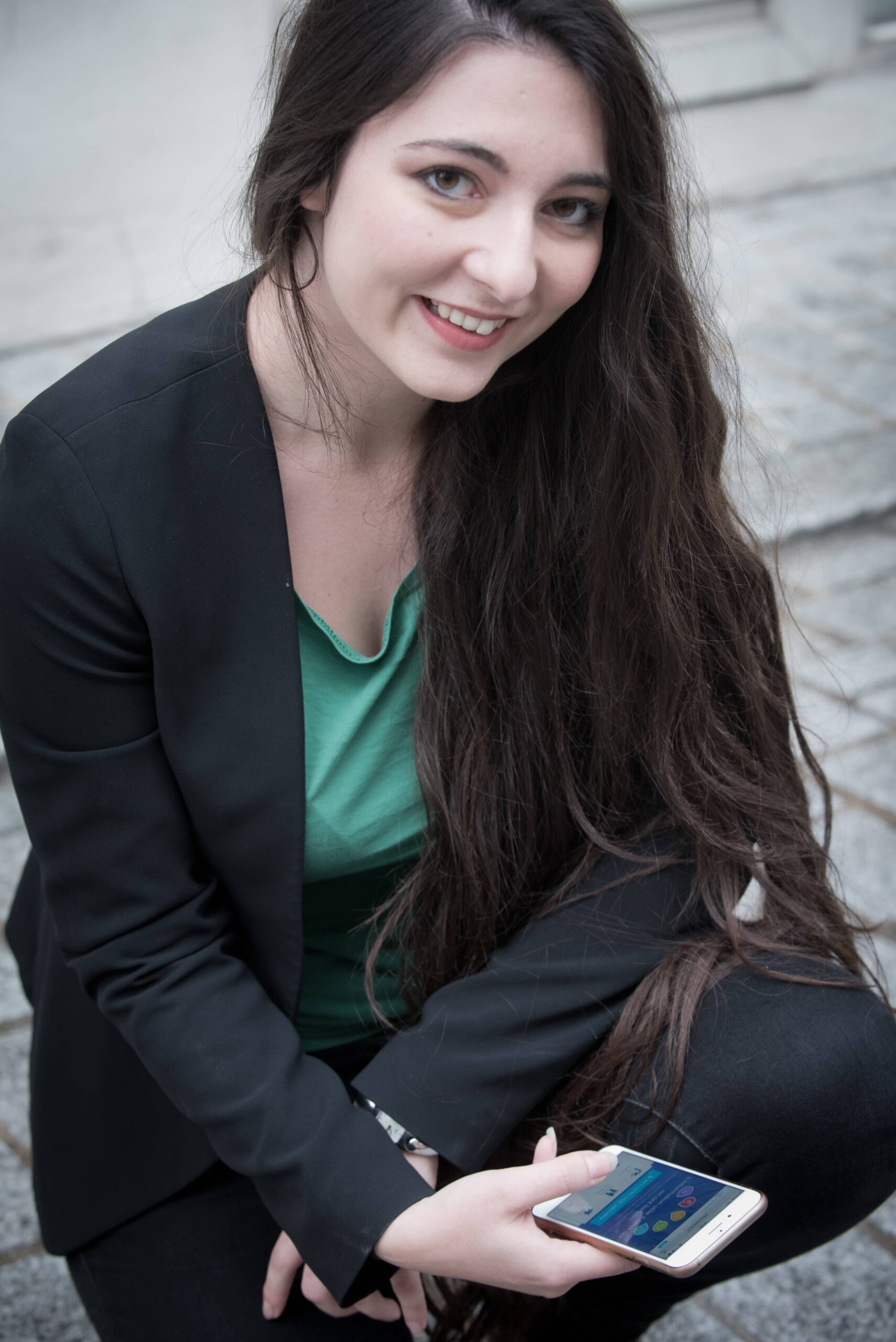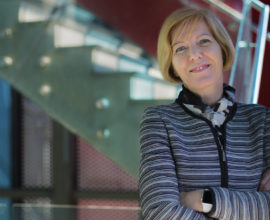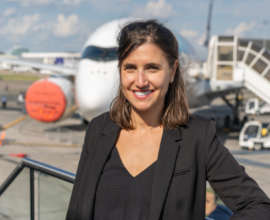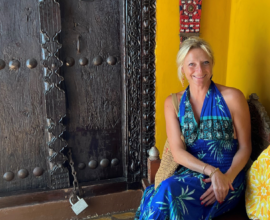Victoria Mandefield
Engineering solidarity
![]() Reading Time: 9 minutes
Reading Time: 9 minutes
Founder & CEO Solinum
Victoria Mandefield is a social entrepreneur and the founder and CEO of Solinum, creator of Soliguide, a survival guide and support for the homeless. She is gaining recognition in France as a key contributor in raising awareness and providing solutions for the homeless. She continues to shake up the world of societal impact, working closely with France’s major support systems, including 115, the call centre run by the emergency social services, as well as the French Red Cross.
Determined, constantly in a hurry, and paring her actions down the essentials, Victoria lives life at 100 km/h. At 28, her days are devoted to creating social impact and she doesn’t bother with detours or taking the long way round. Perched on two packing boxes during her lunch break, she answers our interview questions simply, precisely and directly, her voice hoarse from a persistent cough.
“I don’t pretend that on my own I’m changing the world, but by helping a few people, I am making my contribution and improving the system as a whole. That’s something.”
Tell us about yourself
In 2017, I joined Audencia’s Grande École Master in Management programme as part of the Management and Engineering double degree track in partnership with ECE Paris. I already had a social entrepreneurship project and some technical skills, but I lacked a business plan. I joined Audencia, which I saw as the school of audacity and social responsibility.
At Audencia, I was a perfect fit for the school’s trademark hybrid technical-business profiles. However, I also believe in the hybrid association of audacity and impact, and that was what I was looking for above all.
At the beginning, I devoted a huge amount of time bringing my business skills up to speed, especially in accounting (I’m so grateful for this because I use them every day). Then I headed to San Francisco to a summer school at Berkeley, which was an incredible experience in many ways. I took courses in leadership, innovation and yet more, advanced, accounting. I learnt so much in three months, especially since Berkeley is so ahead of the game in sustainable innovation and social entrepreneurship.
When I came back, I switched to the Master in Entrepreneurship with the Social Economy option. I was lucky enough to be able to follow this course and immediately apply my academic learning to my project, Solinum. Learning through experimentation and immersion was very powerful and exciting and a real added value of the programme. On the other hand, my timetable was a challenge because Solinum was starting to take off and I had many appointments: I often found myself travelling back and forth between Nantes and Paris.
Tell us about Solinum
Solinum is a social start-up that stems from two observations: on the one hand, contrary to popular belief, more than 70% of people living in precarious situations have access to a smartphone, and on the other hand, digital technology is not a dehumanising factor. On the contrary!
If used wisely, digital technology can be used to promote inclusion and care.
Since I have been working in the solidarity sector, I am struck by how slow digital transformation can be. Some multinationals have colossal resources at their disposal just increase a tiny degree of margin, but the associations serving human beings still work with paper and pencil.
When someone asks me whether it’s tech or social impact that characterises Solinum, my answer is clear: the two are inseparable. Technology must serve social impact.
Far from the image of a young engineer with geeky tendencies, then…
If geek means being a video game fan, then yes, I am one, in a way.
I’m especially passionate about automation. I love prototyping! In fact, I hate doing the same thing twice: if you need to do something again, there’s something you can create to save time and maximise the ratio of effort to impact.
In the field of solidarity, this is a very important concept because this is where technology puts the human element back at the heart of the matter. When we save time and and increase reliability on actions with limited added value, we can concentrate on the essential: the human element, the interaction, the encounter.
On the other hand, I also believe that innovation can be very sober. This might sound like a paradox for an engineer, but I don’t support innovation for innovation’s sake. The best tools are sometimes the simplest, especially if they are effective and meet the needs of users. That’s what’s essential in tech: meeting the needs of users, whether they are multimillionaires or homeless.

Why did you choose to focus on homelessness services?
I have been a volunteer ever since I was first a student, distributing meals and warm clothes and providing support to homeless people. With Soliguide, a platform for directing people experiencing homelessness to the services they need, I created the tool I needed as a volunteer.
The starting point of Soliguide was an existing need. In order to point people in the right direction, volunteers compile all the useful information in the field of food aid, socio-professional support, hygiene, health, training, learning French, etc. Then they have to check everything: is it possible to find the right person? Then we have to check everything: is a given structure open at a given time, have they changed their opening hours, is this aid still available, etc.?
Beyond collecting data, and putting it with other similar data, there was the question of making it reliable and available in a simple and practical way for all users, whether individuals or associations.
This is how Soliguide was born. It’s not an extraordinary invention, just a tool that’s simple and uncluttered but extremely powerful because it’s designed to be shared. To make access as easy as possible, we have multiplied the channels with a website, an app, paper lists, a Whatsapp number, etc. We even created the Solidarity API to enable other organisations to retrieve our data and use it to deliver their own support solutions. For example, the Entourage Association, which creates links and local activities for excluded or isolated people, works with our data: we don’t see this as competition at all, but as essential cooperation supporting people in insecure situations.
How does Soliguide work in practice?
Our work essentially consists of collecting, cross-referencing, making reliable and delivering data. Soliguide currently has nearly 50,000 services listed for people experiencing difficulties in 29 departments across France. I am very proud to say that we now cover over 50% of the French population. In 2022, Soliguide enabled more than 1.5 million searches: we can count our impact terms of in hundreds of thousands of lives.
Solinum welcomed its first employee in 2018 and today there are 32 of us raising funds, rolling out projects and circulating our actions to people and organisations working in the solidarity sector. Above all, we co-construct with them because we don’t copy our projects from one territory to another, we adapt them to local realities.
We are subsidised by local and state authorities, particularly because we facilitate the work and increase the impact of social actors. We discovered that we were saving society money and improving the efficiency of public policies: we avoid duplication and holes in the system and we rationalise public decisions. This became very clear during the pandemic.
What impact did the pandemic have on Solinum’s activity?
We were extremely busy in the departments where we were already established and word spread very quickly to the other areas that asked us to deploy urgently. It wasn’t always possible but we did our best.
Imagine how tough lockdown was for people on the street: how did they know what was open and what was closed, how did they know where to find food, etc.? The information on Soliguide enabled us to set up alerts when, for example, all the services in an area were closed.
At the outset of the pandemic, we only covered seven departments and we noted an overuse rate of +200%. In 2021, thanks to an extremely tight deployment methodology, we opened fifteen new departments, which prepared us for the Ukrainian crisis, to which we reacted immediately by translating Soliguide into Ukrainian and identifying the specific structures most needed by refugees from Ukraine.
These successive crises highlight the importance of real-time information for both individuals and public authorities. What we are looking at today is the use of data analysis for social policies in each territory.
You mentioned Solinum’s financials; it’s hard to imagine the solidarity sector being a good fit for a young management school graduate
Let’s face it, my parents would probably have preferred to see me follow a more lucrative career path but it’s one that is in tune with what I want from life. If I earned more by doing something else, would I be as happy? I don’t think so.
That doesn’t mean that you can’t earn a salary by working in this field, the lines are moving on that, but obviously you earn less than in a big company that is destroying the planet.
I earn enough to satisfy my needs. I have enough to satisfy my material needs while still being able to satisfy my immaterial needs, give meaning to what I do and make me want to get up in the morning. The only absolute resource we do have is time, but are we using it wisely? I don’t want a life where I start the week thinking: “Can’t wait for Friday!” or “I can’t wait to be somewhere other than my job!”
My ratio is to earn enough to afford what I need without squandering my time at the expense of the planet, society and myself. The difference in salary is therefore the price of my personal wellbeing.

What is it like to be a woman leader in the solidarity sector?
As a young woman, you’re kind of looking for trouble!
I have been asked more than once if I was the trainee. Beyond the anecdote, which doesn’t hurt me too much, it’s clear that my credibility is at stake. In all walks of life, people look to men first, even in this sector where there are only women in the field. The French only have the feminine term for “social worker”, by the way.
We are in a female-dominated sector, but, more often than not, directed by men in the round table events and on the boards of directors.
I try to make my own path and get things done; actions give credibility. I don’t take offence at what people say or think, I always try to move forward and build on what I achieve.
It’s vital that we look at diversity from another angle, including from the homelessness angle, which is much more contrasted than people imagine. We are not just talking about homeless men, but also about young LGBTQ+ people rejected by their entourage, women escaping violent or abusive relationships, entire families impoverished by migration or social breakdowns. This image of homelessness being a male environment has always been false but today it is increasingly untrue and the pandemic has not helped. We are seeing more and more students using soup kitchens; they used to hold down summer jobs but these disappeared after the pandemic.
The subject is not me or the way people look at women leaders, the subject is how we can all work better together, how we can multiply the viewpoints to better understand and deal with the problems.
You are also on the board of the French Red Cross, what does that entail?
I joined through 21, the Red Cross social innovation accelerator, when Solinum was supported for six months as part of a call for projects, and I fell in love with the organisation. That’s how, two years later, I ended up on the board.
The Red Cross is a very big machine, which may seem slow and heavy to an entrepreneur, but when it moves, it moves powerfully. In an emergency, we know where to be.
I’ve been on the board for a little over a year now. It’s a voluntary position that takes up two days every three months, in addition to the working committees. We study the Red Cross’s legal and strategic orientation to stay on target with the 2030 plan.
The volunteers have a variety of profiles, often with lots of experience, and I am happy to represent the younger generation. The different experiences and points of view enrich the debate, on ecological issues for example.
If you had to give one piece of advice to today’s students, would it be about engagement?
No, engagement is my thing, but not necessarily everyone else’s. I would tell students to search for what makes their heart beat faster and to go for it. Above all, I would tell them that all choices are justifiable even when they don’t seem to be part of a preordained or obvious path.
What can we wish you for the future?
For Solinum, to continue to grow. I don’t want us to become a big organisation, but I do want us to increase our impact. The curve must be exponential as we need to reach more and more people in France and then elsewhere, without increasing our costs tenfold.
For myself, just to finalise my move. My 30th birthday is not so far off and I’m finally leaving my tiny basement flat for somewhere bigger. Just goes to show, anything can happen.
Victoria is founder and CEO of Solinum, a social start-up that she created in 2016 and which publishes the platforms Soliguide and Merci pour l’Invit’, a network of citizen accommodation for reintegration. A board member of the French Red Cross, Victoria is one of Vanity Fair’s 30 under 30 and Carenews’ Top 50 impact entrepreneurs. Her actions and engagement regularly receive recognition; AACSB has recently named her an Influential Leader in their class of 2023.


